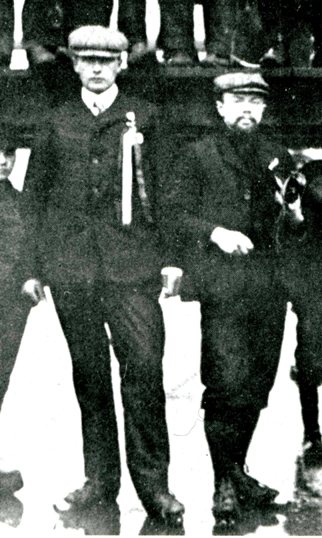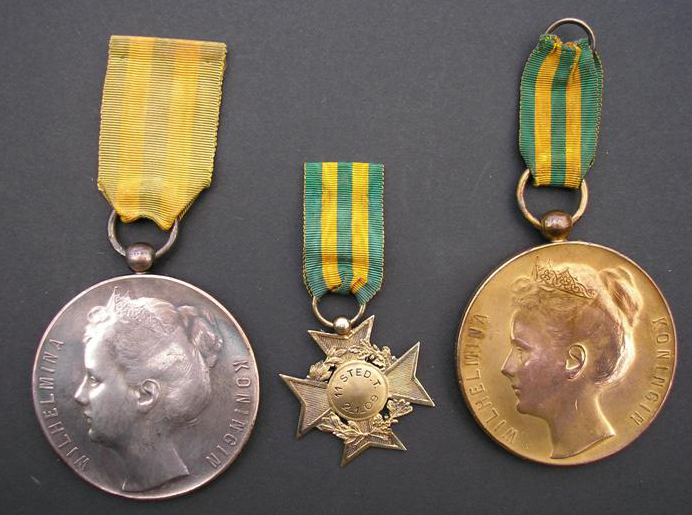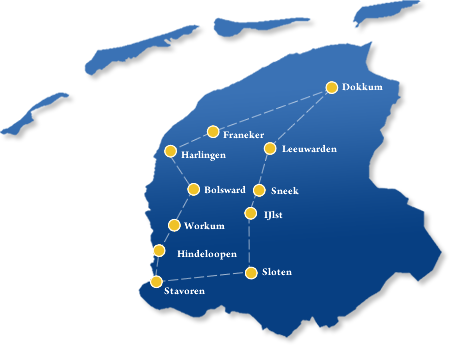Eleven cities, the tour of tours
Author Ron Couwenhoven
Translation Cheryl Richardson, 2019
_1.jpg?1571553177928)
The Elfstedentocht (Eleven City Tour, in Frisian: Alvestêdetocht) is an almost 200 kilometer long ice skating tour organized by the Royal Association of the Frisian Eleven Cities. Because of its great distance and difficulty, the Elfstedentocht is also called "De Tocht der Tochten" (The Tour of Tours). The first was held in 1909.
On Saturday, January 2,1909, Simon Hijlkema, the president of the Frisian Ice Federation, stood on the ice in front of the Amicitia Hotel in Leeuwarden at five o'clock in the morning and shouted: "Have a good trip, gentlemen!" Twenty-three speed skaters skated away towards Dokkum cheering into the dark night. The first Elfstedentocht had begun! Only nine skaters would complete the 200-kilometer ice marathon through the towns of Friesland. Minne Hoekstra, student of theology and son of skating manufacturer Abraham Keimpes Hoekstra from Warga, was the winner.
It was the start of a classic, one of only fifteen that could be organized in more than a hundred years. Hard winters are needed, but it must not be too windy during the frost periods, because the wind creates wakes in the ice that prevent the 15,000 or more skaters from completing the longest and toughest skating marathon in the world.
During the first trip, the ice was poor due to a thaw that made it impossible to skate at Harlingen and Bolsward around noon. In almost all later Elfstedentochts the participants had to deal with bad ice, bumpy ice (ruts/cracks), snow and all kinds of other misery. In addition, skaters regularly had to cope with strong winds, snowstorms and densely packed, snowy tracks, not to mention fierce frost.

All those ingredients made the Elfstedentocht a phenomenon. Those who conquered, became heroes and received the coveted memorial cross made available in 1909 by sports pioneer, Pim Mulier on behalf of his Physical Education Association.
The tour, which initially took the northern route - Leeuwarden - Dokkum - Leeuwarden - Franeker - Harlingen, moved 'round the south' in 1941. This means that from Leeuwarden via Sneek, IJlst and Sloten Stavoren are reached, after which, Bolsward via Hindeloopen and Workum and then one continues via Harlingen, Franeker, the famous Bartlehiem junction, to Dokkum and back to Leeuwarden.
From Harlingen one often has to deal with fierce headwinds from the east.
The winnars

The fifteen Eleven Cities Tours had twenty four winners, of which Coen de Koning, Auke Adema and Evert van Benthem appear twice on the honors list. In 1947, the winner Jo Bosman from Breukelen was disqualified, because he had allegedly 'imposed' on number two, Klaas Schipper, who was also removed from the result. Jan W. van der Hoorn from Ter Aar, who arrived fifth, was declared the winner.
The five winners of 1956 did not receive a gold medal because they had crossed the finish line together, but were not disqualified by the Eleven Cities Board. They were therefore the first to remain in the results. They did receive an Elfsteden cross as finishers, but they are still boycotted by the Elfsteden board on official occasions to this day.
Until 1985 there was no competition for women. The first women to participate in the tours appear in the chart below. Jikke Gaastra came to Sneek as the only female participant in 1912, when the trip was aborted due to unreliable ice on the Zwette. All skaters who reached this city were awarded the Eleven Cities Cross. In 1929 and 1963, not a single woman managed to reach the finish. In 1947, Wobkje Kooistra and Sjoerdsje Faber were the first women to cross the finish line.
|
|
Men |
Woman |
|
2 januari 1909 |
Minne. Hoekstra – Warga |
No women participated |
|
7 februari 1912 |
Coen de Koning – Arnhem |
Jikke Gaastra - Leeuwarden |
|
27 januari 1917 |
Coen de Koning – Leur |
Janna van der Weg - Leeuwarden |
|
12 februari 1929 |
Karst Leemburg – Leeuwarden |
No women arrived |
|
16 december 1933 |
Abe de Vries – Dronrijp |
E.C. de Nekker - Willemsoord |
|
|
Sipke Castelein – Wartena |
|
|
30 januari 1940 |
Piet Keyzer – De Lier |
Sjoerdsje Faber - Warga |
|
|
Auke Adema – Franeker |
|
|
|
Cor Jongert – Alkmaar |
|
|
|
Dirk van der Duim – Warga |
|
|
|
Sjouke Westra – Warmenhuizen |
|
|
6 februari 1941 |
Auke Adema – Franeker |
Wobkje Kooistra - Warga |
|
22 januari 1942 |
Siteze de Groot – Weidum |
Antje Schaap - Wirdum |
|
8 februari 1947 |
Jan van der Hoorn – Ter Aar |
Sjoerdsje Faber - Warga |
|
|
|
Wobkje Kooistra - Warga |
|
3 februari 1954 |
Jeen van den Berg – Nij Beets |
Aaltje van Dellen - Friens |
|
14 februari 1956 |
Aad de Koning – Purmerend |
Annie van Dijk - Hartwerd |
|
|
Jan van der Hoorn – Ter Aar |
|
|
|
Maus Weijnhout – Lisserbroek |
|
|
|
Anton Verhoeven – Dussen |
|
|
|
Jeen Nauta - Grouw |
|
|
18 januari 1963 |
Reinier Paping – Ommen |
No women arrived |
|
21 februari 1985 |
Evert van Benthem – Sint Jansklooster |
Lenie van der Hoorn – Ter Aar |
|
26 februari 1986 |
Evert van Benthem – Sint Jansklooster |
Tineke Dijkshoorn - Schipluiden |
|
4 januari 1997 |
Henk Angenent – Alphen aan de Rijn |
Klasina Seinstra – St. Johannesga |
|
|
|
|
Sources
"Elfstedentocht: A Murderous Marathon", author R. Couwenhoven, sponsor and member of De Poolster.
Route and film footage
 The Elfstedentocht (Frisian: Alvestêdetocht) is organized by the Royal Association of the Frisian Eleven Cities. Leeuwarden, the capital of Friesland and has traditionally been the starting and arrival place. The cities that are visited are Sneek, IJlst, Sloten, Stavoren, Hindeloopen, Workum, Bolsward, Harlingen, Franeker, Dokkum and finally Leeuwarden.
The Elfstedentocht (Frisian: Alvestêdetocht) is organized by the Royal Association of the Frisian Eleven Cities. Leeuwarden, the capital of Friesland and has traditionally been the starting and arrival place. The cities that are visited are Sneek, IJlst, Sloten, Stavoren, Hindeloopen, Workum, Bolsward, Harlingen, Franeker, Dokkum and finally Leeuwarden.
For the website of the Royal Association De Friesche Elf Cities see also the website of the Koninklijke Vereniging De Friesche Elf Steden
The Eleven Cities Tour of 1929
The Eleven Cities Tour of 1963